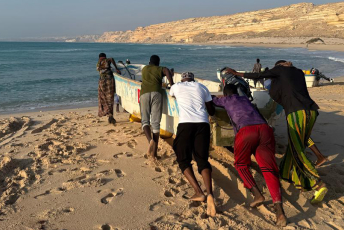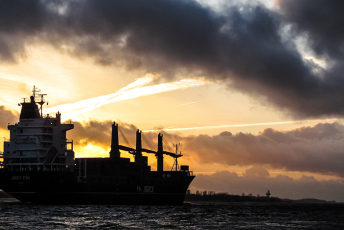On 25 July, the continent observes Africa Day of the Seas and Oceans. It’s an important time to take stock of maritime security around the continent. The Gulf of Guinea continues to be portrayed as the world’s most dangerous maritime space for sea users, but available data may not support this analysis. There is no clear gauge to assess incidents and measure trends, leading to biases in data collection, interpretation and analysis. Data originate from a limited number of sources, are collected through a flawed voluntary reporting mechanism, and use incident monitoring methodologies that lack uniformity and coordination across actors.
Data on maritime crime and security threats are gathered through the tracking and relaying of information on incidents at sea reported – voluntarily – by mariners and shipowners. The way these crimes are labelled, perceived and reported influences policy responses. It also affects the region’s prospects for fulfilling its socio-economic potential and geostrategic importance.
According to a study on world piracy published last month by NGO One Earth Future, ‘the Gulf of Guinea is the area worst affected by piracy and armed robbery of vessels worldwide’. The findings were widely reported on, notably by international media such as the BBC, Forbes and The Economist.
The One Earth Future report itself drew extensively on data from the International Maritime Bureau (IMB) of the International Chamber of Commerce. The IMB publishes quarterly reports on maritime piracy incidents worldwide, which are then used by NGOs, risk agencies and media outlets – usually uncritically, with no questions asked.
According to the IMB’s first quarter report for 2019, ‘the Gulf of Guinea represented a high number of piracy and armed robbery attacks at sea, with 22 incidents reported’. But the report also states that fewer incidents were reported than during the same period in 2018. In the case of Nigeria, for example, which has ranked as a hotspot for piracy over the past decade, the number of incidents reportedly fell from 22 to 14. This contradicts this year’s narrative that piracy is newly growing in the region; perhaps because the One Earth Future report was based on research and IMB data from 2018.
The Nigerian Maritime Administration and Safety Agency (NIMASA) has criticised the IMB, referring to ‘exaggerated security threat levels’. According to Chinwezu Chidi Amuta, a public relations officer with NIMASA, this is because ‘every incident of maritime crime is reported as piracy, which results in higher figures of piracy incidents than the number that actually occurred in reality’.
The agency itself, however, does not collect enough data to support its claims. Speaking to ENACT and the Premium Times Centre for Investigative Journalism (PTCIJ), Dr Dirk Siebels, a maritime security expert at Danish consulting firm, Risk Intelligence, regretted the lack of rigour and focus on the IMB data. He believes that relying on reported piracy incidents alone is not a sufficient measure of all security incidents in the Gulf of Guinea.
The Interregional Coordination Centre (ICC), the body responsible for the Yaoundé maritime security architecture – which was established under the multilateral Yaoundé Code of Conduct to combat illegal maritime activities in the region – monitors piracy by compiling a list of incidents, similar to the IMB. Incidents recorded include kidnapping of crew members; firing on, boarding and hijacking vessels; and attempted attacks.
Unlike the IMB, in theory at least the ICC also monitors non-piracy incidents such as smuggling and trafficking at sea, marine pollution and illegal fishing. In practice, however, the ICC ‘lacks resources to extend activities to these other types of crimes, and only focuses on piracy and armed robbery at sea at the moment,’ Head of Information Management and Communication Col. Emmanuel Bell Bell told ENACT and the PTCIJ.
This strong focus on piracy sometimes leads to misrepresentation of incidents, either intentionally or unintentionally. Such was the case of the Singapore-flagged Barents Sea, an oil tanker seized at the Port of Limbe, Cameroon in February 2019 following a commercial dispute.
Initial media reports of alleged militiamen were later corrected to reflect that the vessel had been seized by members of the Cameroonian military hired by the charterer. This was as result of clarification by the ICC, Bell Bell told ENACT and PTCIJ. He added that such misrepresentations or manipulation by mariners or shipowners are not uncommon in the Gulf of Guinea. For example, he said that he had intercepted a mariner’s report about an alleged piracy attack off the coast of Togo reported in May that, in fact, never took place.
In terms of methodology, the ICC, like the IMB and others, applies the principle of voluntary reporting by mariners and shipowners, as seen above. But the centre also relies on an informal network of contacts – in national naval, customs and security forces in Central and West Africa, as well as local and international media – to verify incidents. Col. Bell Bell admits that this method is challenging.
The implications of flawed data collection, interpretation and analysis include questionable framing of maritime security in West Africa, as Siebels has written. An example can be seen in how reports of alarming rates of violent attacks in the Gulf of Guinea have influenced the ICC’s focus on piracy and armed robbery at sea. This has overlooked or relegated other categories of crimes to the background. Illegal fishing and associated crimes, such as smuggling and trafficking using fishing vessels, for example, do not receive the necessary financial, human and technical resources, and have flourished with little consequence.
Overcoming current data and incident monitoring challenges remains a major concern in the Gulf of Guinea region. Addressing this will not automatically curb criminality in the region, but it would help limit its impact with the right policy responses – such as broadening the focus to include illegal fishing and other prevalent crimes.
Commenting on the release of the above-mentioned 2019 Q1 report, IMB Director Pottengal Mukundan has recommended ‘to continue to build more effective reporting structures to enable a strong, unified response when dealing with piracy incidents’. The IMB acknowledges the ‘importance of information sharing and coordinated action between the industry and response agencies’. Col. Bell Bell suggests creating a network of actors who, at the minimum, could help verify the accuracy of reported incidents at national level.
Working with stakeholders such as national navies, customs officials, judiciaries, mariners and shipowners, as well as regional institutions – including the ICC and fisheries agencies in Central and West Africa – such network members could develop and use a uniform set of baseline criteria to identify incidents. This echoes previous recommendations from research by the Institute for Security Studies, for example to create or enhance coast guards, and expand and support maritime-sharing information centres.
Agnes Ebo’o, ENACT Regional organised crime observatory coordinator – Central Africa; and Dapo Olorunyomi, Executive Director, Premium Times Centre for Investigative Journalism, Nigeria







